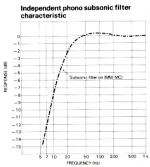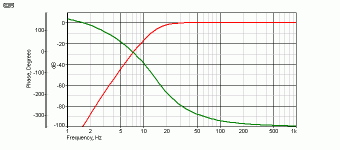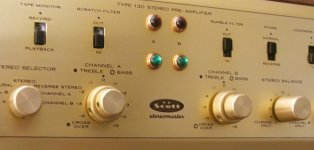Anyone here with a reasonably good viny/CDl set up noticed how much LF gunk there is on classical music?
It’s really only apparent when you use a a sub-woofer. It’s definitely on the recording because for example on the lead-in track and in between tracks there is no ultra-low LF junk. I’ve tested it on quite a few records (eg LSO Firebird Suite, NPO West Side Story on CD). On vinyl with the rumble switched in, there’s a slight reduction, so it seems the LF is between say 20 Hz and 50 Hz.
It’s almost as if traffic rumble is getting into the recording space.
There is none of this on modern jazz/ pop recordings eg Bill Frisell, Fourplay etc so it seems to really arise from recordings made in large spaces.
yes, it is from traffic and sometime air conditioning systems... which can be turned off. Carnegie Hall is all but useless now for recording due to ground vibrations from trafiic right outside the door. Older places are worse than the newer built halls because over time, cars and trucks came into play 🙂
Also found in tape recorders and turntables is wow and flutter and "rumble" Preamps used to have a switchable low freq cut to remove those sounds. Also handled by coupling caps reducing LF. Many ways to try to eliminate such unwanted noise and distortion causing excessive LF cone excursions. Maybe we need a forum to bring back a good Rumble filter which doesnt mess up the rest of the sound.
Its just another of a hundred reasons I would rather improve a digital system and left LP's.


THx-RNMarsh
Last edited:
Modern recordings of orchestral music are wonderful, I guess, but always seem disembodied to me. Nobody still alive and performing now is within a generation of Brahms, as were the last generation to be recorded in mono and the first to be recorded in stereo.
Does it really matter, or should we just accept that things change? I say Bah Humbug! But that's just Seasonal Overload Disorder.
All good fortune,
Chris
Does it really matter, or should we just accept that things change? I say Bah Humbug! But that's just Seasonal Overload Disorder.
All good fortune,
Chris
You still need one of these with an LP system; Rumble filter. [A scratch filter was to remove analog tape hiss]

Unless you get a $50K air bearing TT and add a vacuum and clamp system to flatten the ripples and warps out of the record.
But, still need a rumble filter for what junk was recorded.
The analog LP problems are endemic in a electro-mechanical system. The equivalent in digital is jitter. Most all issues with digital are electronic in nature and thus can be made better in time. The LP is stuck with endemic problems.
A SUB woofer should not be needed for music of you have response to 40Hz. Subs came into vogue for surround sound video systems for Effects channel.
-RNM

Unless you get a $50K air bearing TT and add a vacuum and clamp system to flatten the ripples and warps out of the record.
But, still need a rumble filter for what junk was recorded.
The analog LP problems are endemic in a electro-mechanical system. The equivalent in digital is jitter. Most all issues with digital are electronic in nature and thus can be made better in time. The LP is stuck with endemic problems.
A SUB woofer should not be needed for music of you have response to 40Hz. Subs came into vogue for surround sound video systems for Effects channel.
-RNM
Last edited:
I'd certainly agree that the Golden Age European classical music recordings often (and potentially always) sound much better on CD than vinyl records. Some, like the Szell and Ormandy, never were heard right originally. No surprises there. But the old original vinyl from Mercury and RCA and the great British stuff is still great fun to listen to.
Classical music other than European is harder to find in believably authentic and "hi-fi". Can you find recordings of classical Thai music in-country? Anything with a YouTube reference you'd recommend to a newcomer?
Much thanks, as always,
Chris
Classical music other than European is harder to find in believably authentic and "hi-fi". Can you find recordings of classical Thai music in-country? Anything with a YouTube reference you'd recommend to a newcomer?
Much thanks, as always,
Chris
Classical or original Thai music is awful sounding. IMO. But, there are good music halls here for orchestral music. Several world-class venues and more coming.
See this -- YouTube
A really great source for well recorded, great sound plus music from many cultures.. original and beautiful to hear - can be found on Putamayo Records
-RM
See this -- YouTube
A really great source for well recorded, great sound plus music from many cultures.. original and beautiful to hear - can be found on Putamayo Records
-RM
Last edited:
We all like the music from when we were young and juicy best, but the world is full of great classical music. All of it, including the European classical music of our childhoods (for our, American, generation anyway) demands a lot more attention than can often be given these days.
Some of my favorites are on the Nonesuch Explorer series, very easily available, including most on CDs. I'll immediately check out the Putamayo catalog.
Always the best,
Chris
Some of my favorites are on the Nonesuch Explorer series, very easily available, including most on CDs. I'll immediately check out the Putamayo catalog.
Always the best,
Chris
It used to be noted as a sign of a good system if you could hear the kingsway hall rumble. Decca fitted filters on the recording equipment at some point to remove it. I have a chandos recording from a few years ago that has a huge amount of infrasonic something on it. I thought there was something wrong with the analysis so got Pano to take a look and he found the same. I did think of writing to them.Anyone here with a reasonably good viny/CDl set up noticed how much LF gunk there is on classical music?
.
You didn't have to hear it on the monitors. You can feel it in the building. When I've not been to London for a while I get those 'wtf'' moments as the whole building vibrates a bit.There're a lot of anecdotal stories of orchestral recordings from the Golden Age being timed to fit between subway trains. I'm very surprised that they could hear it from location monitors, but maybe it was just learned by experience.
That would be a miracle, a pre amp that could remove wow and flutter with a low freq cut switch.Also found in tape recorders and turntables is wow and flutter and "rumble" Preamps used to have a switchable low freq cut to remove those sounds.
I’m sorry, not to be nasty, but this is all really ......Many ways to try to eliminate such unwanted noise and distortion causing excessive LF cone excursions.
And the 5th order 100dB/dec filter curve shown is way beyond what will ever be needed to remove rumble, but you did not even mention what exactly you wanted to prove with it.
Hans
You didn't have to hear it on the monitors. You can feel it in the building. When I've not been to London for a while I get those 'wtf'' moments as the whole building vibrates a bit.
There's a lot of reality that contemporary recordings just don't capture. And sometimes there's just too much reality:
YouTube
Flutter on yer bottom,
Chris
yes, it is from traffic and sometime air conditioning systems... which can be turned off. Carnegie Hall is all but useless now for recording due to ground vibrations from trafiic right outside the door. Older places are worse than the newer built halls because over time, cars and trucks came into play 🙂
Also found in tape recorders and turntables is wow and flutter and "rumble" Preamps used to have a switchable low freq cut to remove those sounds. Also handled by coupling caps reducing LF. Many ways to try to eliminate such unwanted noise and distortion causing excessive LF cone excursions. Maybe we need a forum to bring back a good Rumble filter which doesnt mess up the rest of the sound.
Its just another of a hundred reasons I would rather improve a digital system and left LP's.
View attachment 804816
View attachment 804817
THx-RNMarsh
Hi Richard,
I’m getting it on classical CD’s as well - it’s no different volume wise. I guess this must be aircon and traffic noise picked up on the original recordings.
Might be the answer is I have to have a switchable turnover frequency - currently my filter is 20 Hz but should be optionally switchable to say 45Hz. I will need to get some of these recordings on a spectrum analyzer to look at what’s on there to confirm it though.
Agree with the close mic’d recordings - there are no problems on those.
You still need one of these with an LP system; Rumble filter. [A scratch filter was to remove analog tape hiss]
View attachment 804819
Unless you get a $50K air bearing TT and add a vacuum and clamp system to flatten the ripples and warps out of the record.
But, still need a rumble filter for what junk was recorded.
The analog LP problems are endemic in a electro-mechanical system. The equivalent in digital is jitter. Most all issues with digital are electronic in nature and thus can be made better in time. The LP is stuck with endemic problems.
A SUB woofer should not be needed for music of you have response to 40Hz. Subs came into vogue for surround sound video systems for Effects channel.
-RNM
I sometimes use the LS50’s for classical and they drop off quickly after c 80 Hz. A lot of speakers drop off below this frequency anyway because of room placement etc - a sub always opens this up. But, even if you didn’t use a sub and the response was flat to 20 Hz you’d still have this as it’s recorded on the source - CD and vinyl. It’s not a media issue but a recording space artifact.
I'd certainly agree that the Golden Age European classical music recordings often (and potentially always) sound much better on CD than vinyl records. Some, like the Szell and Ormandy, never were heard right originally. No surprises there. But the old original vinyl from Mercury and RCA and the great British stuff is still great fun to listen to.
Classical music other than European is harder to find in believably authentic and "hi-fi". Can you find recordings of classical Thai music in-country? Anything with a YouTube reference you'd recommend to a newcomer?
Much thanks, as always,
Chris
One of the best recordings I have ( on CD) is the NYP ‘West Side Story’. Recorded in 1963 IIRC in a hotel in NY. Fantastic imaging, bass. I think US classical recordings are as good as anything. That said, Decca’s 1960’s recordings are also highly regarded. I some great DG stuff but I’ve also heard some of there stuff that I find quite flat.
... part of the evil Harman group.
Which also produces brilliant products like the CD5005 and some of the world's best loudspeakers under the JBL brand name.
‘In the case with the image that he posted, it's about 15 db hot in the bass region.’
You can never have enough bass. 😀
You can never have enough bass. 😀
Last edited:
@billshurv I have a Decca VSO recording of Sibelius’s 5th - I’ll try that later today to see if it has the noise.
In the past, Mr. Marsch was against the use of high order HP filters due to group delay they introduced. Things may have changed now.
There is subsonic content in all opera and symphonic large spaces live recordings I have, made worldwide (except some very early ones), not all attributable to subway/traffic. It’s part of the building acoustic signature (compare recordings captured at different times at same space).
Later multi mike recordings, probably due to phase difference among the wide-spaced mikes, happens to end with less subsonic content.
The contribution of reel recorders, LP cutting lathe and playback equipment on subsonic content should be equal among live-large space and studio-smaller space recordings.
George
There is subsonic content in all opera and symphonic large spaces live recordings I have, made worldwide (except some very early ones), not all attributable to subway/traffic. It’s part of the building acoustic signature (compare recordings captured at different times at same space).
Later multi mike recordings, probably due to phase difference among the wide-spaced mikes, happens to end with less subsonic content.
The contribution of reel recorders, LP cutting lathe and playback equipment on subsonic content should be equal among live-large space and studio-smaller space recordings.
George
A SUB woofer should not be needed for music of you have response to 40Hz. Subs came into vogue for surround sound video systems for Effects channel.
How do you get accurate bass in your room without subwoofers?
@billshurv I have a Decca VSO recording of Sibelius’s 5th - I’ll try that later today to see if it has the noise.
I can't recall when Decca put the extra filtering in. I'll try and look that up.
Recording capabilities haven't really changed all that much since the two and three track era. A few dB here and there hardly matter when played back. The orchestral cost changed, so recording tech changed. The ability to punch in is such a huge dollar multiplier that spot mic'ing became mandatory. Keeps costs down, allows solo spot-mic'ing. Listening style changes, Hey! I like the clearer solo, so we need to spot mic all solos, etc.
Recording of European classical music changed dramatically in the early 1960s from an ideal of the reverbrant sound in the room to an ideal of one's perception of the music. The Beatles finished the transition to the modern era. Hopefully, the next gen will make something better, but I'm still waiting.
All good fortune,
Chris
Recording of European classical music changed dramatically in the early 1960s from an ideal of the reverbrant sound in the room to an ideal of one's perception of the music. The Beatles finished the transition to the modern era. Hopefully, the next gen will make something better, but I'm still waiting.
All good fortune,
Chris
- Status
- Not open for further replies.
- Home
- Member Areas
- The Lounge
- John Curl's Blowtorch preamplifier part III